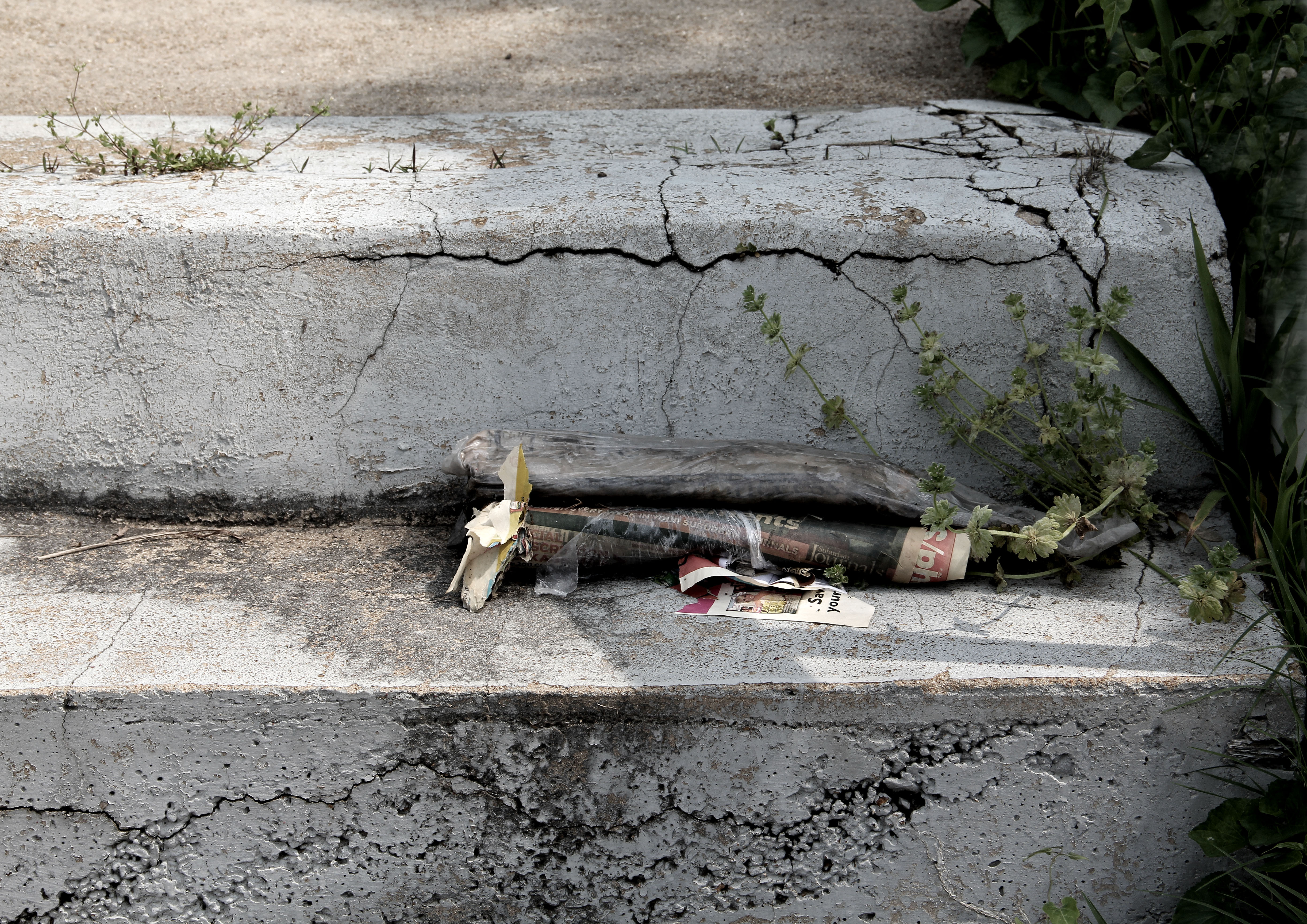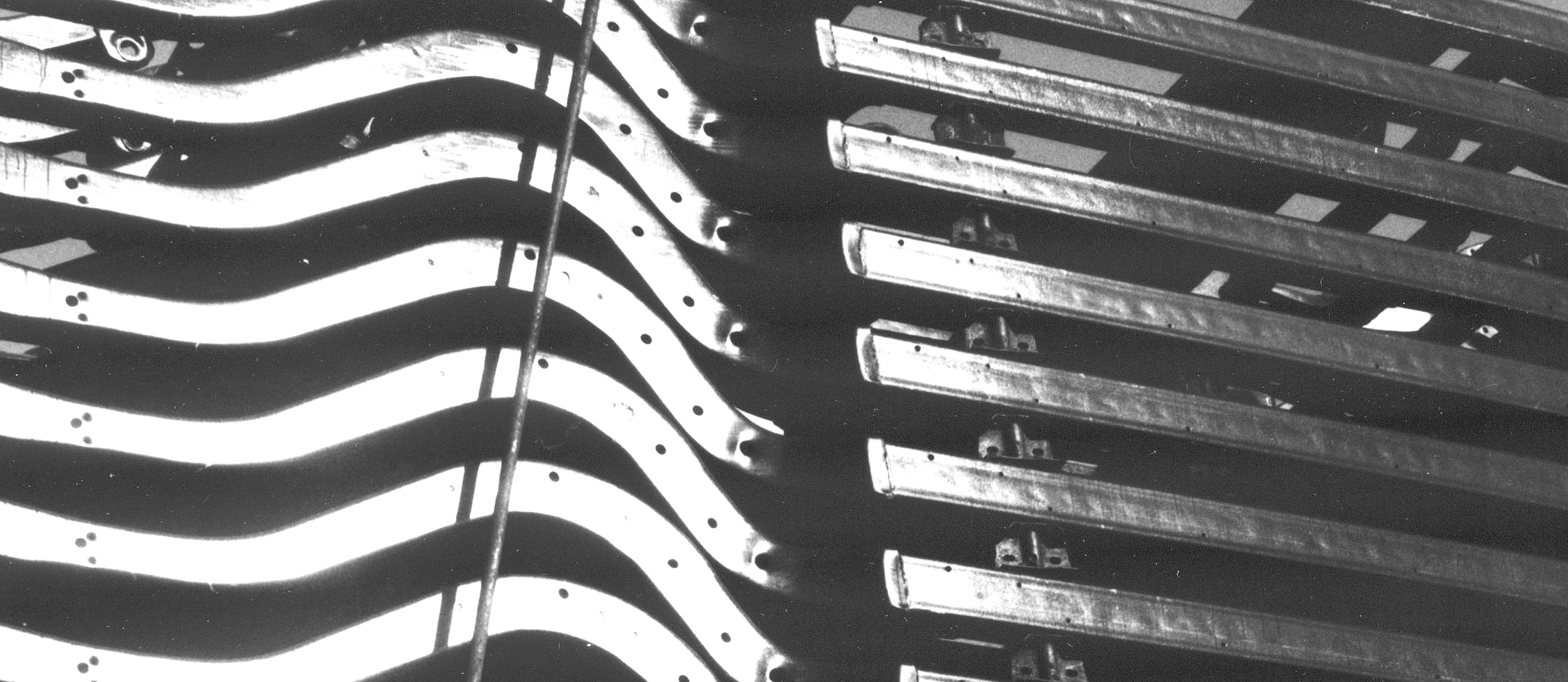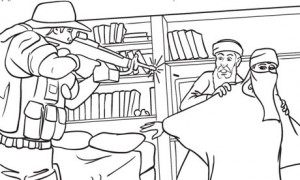
Category: Absurdity
The Oxford Comma Debate

Revenge Porn
- Posted on
- – 5 Comments on Revenge Porn
There is probably no way for me to write this without tripping over some bloodthirsty reactionary’s sensibilities, but you know, I don’t really give a damn.
In my home town, too.
A St. Louis publishing company has released a 9/11 coloring book. There is a reaction to it here. Wonderful cover.
 Very patriotic. Nothing violent on the cover itself, but there are the twin towers and, I think, the proposed memorial tower.
Very patriotic. Nothing violent on the cover itself, but there are the twin towers and, I think, the proposed memorial tower.
Oh yes, and a cross. This is, after all, commemorating the assault by Muslims against Christians.
The subtitle is interesting: A Graphic Coloring Novel on the Events of September 11, 2001.
A novel.
Hmm.
Well, it is rated PG, I suppose that’s something.
One of the inside images has been getting a great deal of press as an example of what can be found inside.
Yes, indeed. A depiction of a SEAL shooting Osama Bin Laden, through one of his wives. They even made sure you could see the bullet. They have also depicted Bin Laden as something of a coward—he’s clearly cringing behind the brave woman set to take the shot for him.
This is about as bad as the Easter Baskets Walmart offered one year full of missiles and bombs.
Let me be clear here: I do not mourn Osama Bin Laden. I feel he was a hateful man who did terrible things and has left the world a much more dangerous place than it was before. I might have certain moral quibbles about the manner of his demise, but one of my overwhelming feelings is that this is how it ought to have been done back in 2001 and 2002. The excessive eruption of American military response that has left us with depleted moral force in a world that was already ambivalent about us, mired in two wars that should have been over long ago had they not been disastrously mishandled (and which, according to a recent study, has cost us close to 60 billion in funds stolen by contractors in Iraq alone), and with a hair-trigger police-state mentality that has crippled us in actual problem-solving, much higher energy costs, and a political landscape that will require a combination of Solomon, George Washington, and Albert Einstein to untangle was the most egregious example of vengeance-seeking since Johnson’s refusal to get out of Vietnam. Had we concentrated on finding Bin Laden and sending special teams to go get him, we would have accomplished much m0re.
But that would have meant a trial, probably, and a stage on which he might have aired his complaints. And after all we had a president with something to prove and a vice president whose lust for power is rarely found outside of a bad novel.
So we now have a coloring book to do more damage by covering up the farce that the last decade has been in the eyes of children who will come of age learning the official version, reinforced by the simple activity of filling in between the lines the pictures in a novel that is basically about revenge.
I suppose it would be a hard thing to sell if it told the truth, which is that basically in the aftermath of 9/11 America enjoyed more absolute global sympathy than at any time since WWII and we squandered it by acting stupidly. All this know-how—and we have a lot of that, really—ignored, misused, pissed away.
It’s possible to characterize almost every war, especially since the end of the 19th Century, as a means by which industry has made more money. There’s a component of that to every conflict, even WWII, which really was about evil in the world. But I can’t think of one that has been more nakedly so than Iraq. With the revelation of the graft and corruption and the outright theft and the complete lack of accountability, it is impossible not to see it as having been instigated for the sole benefit of multinationals, Halliburton being first and foremost.
But we can’t tell kids that. Can’t have them grow up thinking the people who run their country can ever be stupid, or greedy, or vain, or misguided, or duped, or simply wrong. Can’t have that.
So let’s dress it up like another excusable example of John Wayne diplomacy.
Shit.
Around The Neighborhood
Playing Around
I’m trying another new theme. One of these days I may build something all my own…or, at least, watch while someone who knows how to do it builds something for me at my direction.
But I like this one, I think I’ll leave it alone for a while. It’s more in tune with what I like to think myself all about—broad vistas, cosmic scenery, special effects. Well, maybe not so much special effects, but, you know, skiffy.
 From what I have seen so far, I’m very much liking the new WordPress. Of course, that means I’m distracted. This is not the sort of writing I need to be doing just now.
From what I have seen so far, I’m very much liking the new WordPress. Of course, that means I’m distracted. This is not the sort of writing I need to be doing just now.
I particularly like this feature, inserting images and adding text alongside. This may be old hat to a lot of seasoned bloggers, but till now I haven’t been able to do it. It’s more the sort of thing I’ve been wanting to do. I have a lot of images that will serve fine as accent, but I don’t want them as the main attraction.
It’s Saturday and once again Donna is at work. Audit season, we don’t see much of one another. For the time being, that’s okay since I do have a book to finish. Once I get done telling you all this, I have to go back to the 1780s and get with it.
I finished the first rewrite for my new agent (in case I haven’t mentioned that previously). The alternate history is out the door. My door. She still has to pass on it and tell me it’s brilliant. Meanwhile, I’m working on the historical mystery, and this week I ran into the chapter from hell. One of those miserable pieces of writing that has a good deal of parts I don’t want to love, but embedded in a marsh of motionless gunk. I finally figured out how to fix it, but it requires throwing a lot of what’s already there in the can, and I am loathe to do it. As this is Saturday and my love is nowhere near (hell, even the dog is out of the house, at the groomer’s), I have no excuse.
So enough. I have a couple of more studied posts I want to do later—one in particular on the new Yes album, which after three weeks I still quite like—and maybe some more political kvetching, of which there is ample to kvetch about. But I must end this playing around now and do some serious work. Really. Right now. I’m going.
Later.
Pathetic
Representative Andrew Weiner has admitted that the now-famous snapshot of cock-in-shorts really is his. I have only one reaction:
What the hell is wrong with these people?
I am a photographer. I photographed all sorts of things, even naked people, and I have taken more than a few photographs for laughs. But I was never tempted to mail any of them to someone just on a lark!
This is beyond juvenile behavior. Sorry. It’s not even so much that boys will play with their toys, but there must be something about being able to tweet that scrapes a few I.Q. points off. I don’t tweet. Maybe if I did I’d have to enter a 12-Step Program to stop myself from doing really stupid shit with it.
Really, though. I thought this man was smart. I love his rants on the House floor against the inanities of the Right. He is lucid, he is informed, he is on point. If I had his phone number right now I’d call and say, “Andrew! What the hell? This is the kind of stupid shit Republicans do!”
Not all Republicans, obviously, and not even the majority, but the ones who seem to blow the hardest and screel the loudest about FAMILY VALUES have a track record of this kind of embarrassing private nonsense.
Oh, well. Weiner says he won’t quit. Let’s see if that will work. This will likely really damage his effectiveness.
Come on, you guys…grow up.
Still Here

So, it’s the 23rd of May now. I heard on the radio this morning someone claiming that we’re now in the Tribulations and that we’ve got 153 days before the actual end of the world. That might be just about enough time for me to finish the rewrite on my desk and the new novel I am now half-finished with.
I thought about writing something scurrilous and amusing, but why? People who would laugh at it don’t need to be reminded that this was silly and those who wouldn’t laugh likely wouldn’t read my blog anyway. And there’s the story about the kids whose parents, utterly convinced that this was the weekend, had quit their jobs and went on Mission, handing out tracts and stopped paying attention to the college fund the kids were acutely aware of. How many people have basically torpedoed their futures by reacting in similar ways to this thing? It’s not funny, it’s sad.
But it’s not like this is the only thing people spend inordinate amounts of time and money on that make no sense. Dedicated conspiracy theorists, the Area 51 crowd, Birthers, white supremacists, STURP fanatics, various fan groups dedicated to a tv show or music group among whom there are certainly members whose entire lives are dedicated to worship to the exclusion of all else, including personal relationships…
So I think I won’t crack wise about this. It seems to me that the truly Left Behind are all those folks who’ve basically given up on life in order to feed their obsession with being one of the Elect. I just can’t really bring myself to find it amusing.
Rapture Ready
This weekend, it’s supposed to be all over. Harold Camping of the Family Radio evangelist organization has announced the Rapture for May 21st—at six P.M.
In my own little patch of interest, the SFWA Nebula Awards will be given out this weekend. If Mr. Camping is right, this will be the last of these. Going out in grand style, that.
I don’t have a lot to say about this other than it’s silly. It’s one more reason that makes me wonder about the people who follow this kind of nonsense. I can’t help but think that, beneath all the sanctimony and babble, a lot of these folks are just, well, unfortunate. Wishing for it all the Be Over so they don’t have to deal with reality anymore. Unfair, perhaps, but from my encounters with folks like them over the years I’ll stand by it. This is the ultimate “grass being greener” thinking and I no longer get angry at the absurdity but feel sad at the wonders they pass up spending so much time anticipating the end of wonder.
On the other hand, I have a pile of work that will take me a lot longer than the next three days to get done. It would be pleasant, at least for a short while, not to have to worry about it. But at some point I’d start to resent the interruption.
I asked some Jehovah’s Witnesses once if they ever thanked Zoroaster for the very idea of the Apocalypse and they returned blank stares. What? Zoro-who? After all, they keep coming up with new predictions for something which, according to their founder, Charles T. Russel, should have happened back in 1914. (This was his final guess after previously predicting Christ’s return for 1874, 1878, 1881, and 1910.) They got that one wrong, but Russel’s successor, Joseph Franklin Rutherford (who gave the movement the name Jehovah’s Witnesses) revised the date to 1916. Later it was moved up to 1918, 1925, 1941, 1975, 1984, and 1994.Â
William Miller, founder of the Seventh Day Adventists, had predicted the Rapture for 1843 using a complicated bit of figuring based on Daniel. He revised it to 1844 when the January 1st rolled around and everyone was still here.
More recently, Edgar Whisenant, a former NASA engineer and self-taught Biblical scholar, published a little book, 88 Reasons Why The Rapture Will Be In 1988. He gave 300,000 copies away for free, but sold 4.5 million.
There were dueling predictions about 1994, one from Pastor John Hinkle of Christ Church in L.A., who claimed June 9th. Our Mr. Camping held out for September 6. Obviously he’s revised that estimate.
Still, the one to bet on by virtue of it having been figured by a true mathematical genius remains Sir Isaac Newton’s prediction that 2060 is the year. No sooner than, Newton claimed.
But then there are the words of Mr. Whisenant to keep in mind: “Only if the Bible is in error will I be proved wrong.” Might turn out to be that he was the shrewdest of the bunch—unless some of them play the stock market and contrive to short stocks that might fall as Rapture approaches. For myself, this Saturday is another coffee house at which I’ll be playing music and indulging a different kind of rapture. Oh, and it will be in a church, in case you’re wondering. The once-monthly event takes place in a Methodist church in the neighborhood. So if it comes, I’ll be doing something I love, and that wouldn’t be a bad way to go.
My Obligatory Piece About Ayn Rand
From time to time, here and there, someone brings Ayn Rand up as some kind of role model. Lately it’s even in the national news, thanks to the Tea Party and an apparently not very good film of Rand’s seminal masterwork, Atlas Shrugged. The uber conservatives now crowding reason out of the halls of congress with their bizarro legislation and their lectures from the floor and on committees about how their toilets don’t flush right so why should regulations on light bulbs be passed are the children of the Dragon’s Teeth cast randomly by Ms. Rand and her philosophical cult followers. It amazes how people who profess to believe in a philosophy of independent thought can sublimate themselves so thoroughly to the dogmas of that philosophy and claim with a straight face that they are free thinkers on any level. The phrase “more Catholic than the pope” comes to mind sometimes when crossing verbal swords with these folks, who seem perfectly blind to the contradictions inherent in their own efforts. Rand laid out a My Way or the Highway ethic that demanded of her followers that they be true to themselves—as long as they did as she directed.
Ayn Rand’s novels, of which there were three (plus a novella/parable I don’t intend to discuss here), moved by giant leaps from promising to fanciful to pathetic. There are some paragraphs in any one of them that are just fine. Occasionally a secondary character is nicely drawn (Eddie Willers is possibly her most sympathetic and true-to-life creation) and from time to time there is even a moment of genuine drama. But such bits are embedded in tar pits of philosophically over-determined panegyric that drowns any art there might be.
But then, her devoted fans never read them for the art.

What Rand delivers in both The Fountainhead and Atlas Shrugged is a balm to the misunderstood and underappreciated Great Man buried in the shambling, inarticulate assemblage that is disaffected high I.Q. youth.
The give-aways in both novels involve laughter. The opening scene in The Fountainhead characterizes Howard Roark for the entire novel, prefiguring the final scene in the novel, which translated to film perfectly in the weird 1947 Gary Cooper thing.
Howard Roark laughed.
He stood naked at the edge of a cliff….He laughed at the thing which had happened to him that morning and at the things which now lay ahead.
Of course, the thing that had happened to him that morning was his expulsion from university for not completing his assignments. You can pretty it up with philosophical dross, but basically he didn’t do what he was required to do, instead opting for self-expression in the face of everything else. Hence the misunderstood genius aspect, the wholly-formed sense of mission, the conviction of personal rightness, and the adolescent disdain for authority no matter what.
But his reaction? To laugh.
Any other kid in the same situation generally goes skulking off, bitter and resentful, harboring ill thoughts and maybe an “I’ll show you” attitude that may or may not lead to anything useful.
But not a Rand character. They laugh. It’s Byronic in its isolated disdain for rules or logic or anything casually human. It’s a statement of separation.
It’s also just a bit psychotic.
The other scene is from Atlas Shrugged in which Dagny Taggart falls into bed with Henry Reardon. Both are depicted as mental giants, geniuses, and industrial rebels. They are self-contained polymaths who make their own rules. And one of the rules they now make for themselves is that adultery is the only sensible choice for two such kindred beings.
And as they’re tumbling into an embrace?
When he threw her down on the bed, their bodies met like the two sounds that broke against each other in the air of the room: the sound of his tortured moan and of her laughter.
Of course, this most poignant moment is preceded by a long paragraph of Dagny explaining to Hank Reardon that she was going to sleep with him because it would be her proudest moment, because she had earned it. It’s really rather ridiculous. It’s the kind of thing that, if done at all, would most likely occur at the end of an affair, when both parties are trying to justify what they’d done, which is basically commit adultery because, you know, they wanted to.
But it’s the laughter that characterizes these two people in these moments. Crossroads for them both, turning points, and what do they do? They laugh. You can’t help but read contempt into it, no matter how much explanation Rand attempts to depict them as somehow above it all. For her it’s the laughter of victory, but in neither case is there any kind of victory, but a surrender.
Later in Atlas Shrugged Reardon gives her a bracelet made of his miracle metal and upon snapping it closed on her wrist, she kisses his hand, and it is nothing short of a moment from Gor. Dagny gets traded around through the novel until she ends up with John Galt, and no matter how much Rand tries to explain it, the scenarios she sets up for each transition turn Dagny into a groupie. She becomes by the end of the novel the prize each of them men gets when they’ve done a particularly impressive trick.
Rand attempts to portray their interactions (if you can call them that—really, they’re more contract negotiations, which means Rand owes an implicit debt to Rousseau) as strenuously righteous achievements. No one just has a conversation if they’re a Rand hero, they declaim, they negotiate, the issue position statements. They are continually setting ground rules for the experience at hand, and while maybe there’s something to this (we all indulge this sort of thing, from earliest childhood on, but if we tried to do it with the kind of self-conscious clarity of these people nothing would ever happen), it serves to isolate them further. They are the antithesis of John Donne’s assertion and by personal fiat.
Only it isn’t really like that.
The problem with being a nerd is that certain social interactions appear alien and impenetrable and the nerd feels inexplicably on the outside of every desirable interpersonal contact. People like Rand attempt to portray the group to which the nerd feels isolated from as deliberately antagonistic to the nerd because they sense the nerd’s innate superiority. This is overcomplicating what’s really going on and doing so in an artificially philosophical way which Rand pretends is an outgrowth of a natural condition. The messiness of living is something she seeks to tame by virtue of imposing a kind of corporate paradigm in which all the worthwhile people are CEOs.
As I said, it’s attractive to certain disaffected adolescent mindset.
But it ain’t real life.
I have intentionally neglected the third novel, which was her first one—We The Living. I find this book interesting on a number of levels, one of the most fascinating being that among the hardcore Randites it is almost never mentioned, and often not read. The reasons for this are many, but I suspect the chief one being that it doesn’t fit easily with the two iconic tomes. Mainly because it’s a tragedy.
We The Living is about Kira Argounova, a teenager from a family of minor nobility who comes back to Moscow after the Revolution with the intention of going to the new “classless” university and becoming an engineer. She wants to build things and she knows that now is her chance. Prior to the revolution, she would never have been allowed by her family or social convention—her destiny was to have been married off. That’s gone now. We never really learn what has become of the rest of her family, but we can guess. And Kira is intent on pursuing her dream.
But she can’t. Because she is from minor nobility, she soon runs afoul of the self-appointed guardians of the Revolution, who oust her from the university just because.
She ends up a prostitute, then a black market dealer. She becomes the lover of an NKVD agent and uses him. She is already the lover of a wannabe counter-revolutionary who can’t get his game on and ends up in self-immolation. The NKVD agent self-destructs because of the contradictions she forces him to see in the new state and Kira goes from bad to worse and finally makes an attempt to escape Russia itself and ends up shot by a hapless border guard at the Finnish border. She dies just inside Finland.
It is a strikingly different kind of novel and it offers a glimpse of where Rand might have gone had she stuck to this path. Sure, you can see some of the seeds of her later pedantry and polemic, but the bulk of the novel is heartfelt, an honest portrayal of the tragedy of dreams caught in systemic ambivalence.
One can understand the source of Rand’s fanatic love of the United States—she grew up under the early Soviets, and there’s no denying that this was a dreadful system for a bright, talented, intellectually-bent young woman—or anyone else, for that matter—to endure. The freedom of the United States must have been narcotic to her.
But she fundamentally misunderstood the American landscape and identified with the glitzy, large-scale, and rather despotic “captains of industry” aspect rather than the common citizens, the groundseed of cooperation and generosity and familial observance and openness that her chosen idols took advantage of rather than provided for. She drew the wrong lessons and over time, ensconced within her own air-born castles, she became obsessively convinced that the world was her enemy and The People were irredeemable.
Sad, really. Sadder still that so many people bought into her lopsided philosophy.
She made the mistake so many people seem to make in not understanding that capitalism is not a natural system but an artifice, a tool. It is not a state of being but a set of applications for a purpose. It should serve, not dictate. She set out a playbook which gave capitalism the kind of quasi-legitimate gloss of a religion and we are suffering the consequences of its acolytes.
However, it would seem the only antidote to it is to let people grow out of it. There’s a point in life where this is attractive—I read all these novels when I was 15 and 16 and I was convinced of my own misunderstood specialness. But like the adolescent conviction that rock’n’roll is the only music worth listening to and that the right clothes are more important than the content of your mind, we grow out of it.
Some don’t, though. And occasionally they achieve their goals. Alan Greenspan, for instance.
And even he has now admitted that he was wrong. Too bad he didn’t realize that when he was 21.
On Being Fooled
Okay, it’s April 1st. We all know what that means. I have myself played an occasional prank in years past, but tend not to as a matter of principle.
See, I don’t care much for being teased. Lots of reasons, but a big one has to do with having been not particularly cool for a very significant part of my childhood, which meant not being “in” on a lot of the current really important stuff that all my peers thought was the basis of timeless significance. So I was an easy mark when it came to being tagged in pranks and April Fool’s Day was a big one for being made to feel, well, stupid.
Fast forward. I still don’t care for being teased. As a result, I usually don’t tease other people. Can’t take it, don’t dish it out, even though I recognize that it actually isn’t a big deal anymore and in many instances it is a demonstration of affection. I’ve learned to accept it in small doses, but there comes a point past which I start to bristle and…
Well, it’s been likewise a long time since I was taken in by an April Fool’s hoax, and this morning I bought a good one, hook-line-and-sinker fashion, and then compounded it by letting everyone know.
Arrogance being far worse than humility, we should all be gracious about being reminded how not sharp we often are. You take your humility where you can get it and let it be a lesson, etc etc etc. Happy April Fool’s Day, everyone, and may it all end with a laugh and better assessment of where we are with ourselves.
Oh, the prank? This one here.


